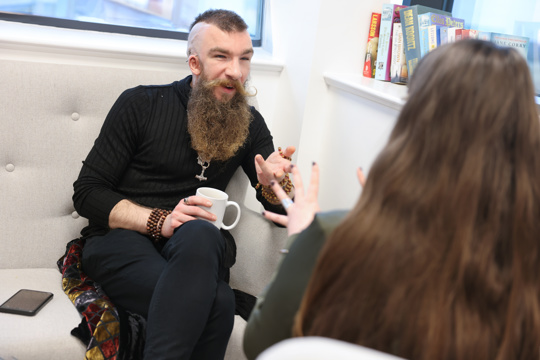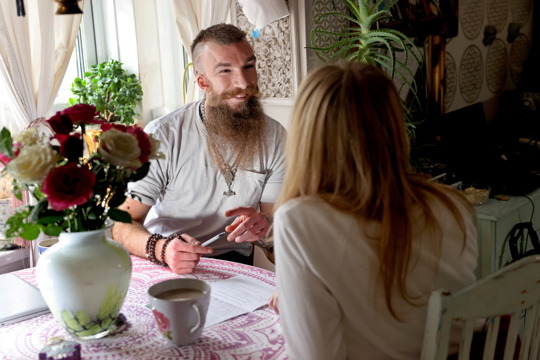Support worker Liam Erskine chatted to us about how he works with people in our communities to make positive changes so they can live more independently.
My role as a support worker involves going out to meet people who have been identified as having additional support needs, often due to having a mental health condition.

I provide support on everything, from looking at medical advice or mental health stresses, to supporting with routines around cleaning, eating activities or exercise. I look at the things they are unable to do and try and explain the process so they can start doing these for themselves.
I tend to meet them in their personal environment, maybe meeting them in a café where they feel comfortable or in their home. This gives me the chance to learn about their motivations, interests, perspective and confidence, building a foundation about their experience.
For processes like this, it’s important to build strong authentic relationships, because they’re putting a lot of faith in you and your support so there needs to be a level of trust. Sometimes we can be the first ever person to support them, so that trust is crucial. The more you can learn about what they can do, the better. Each individual is different, and we need to understand their circumstance and see how we can support them.
A big part of that is identifying skills and areas for development and helping people to build on those in a way that’s lasting beyond my involvement.

I work with one individual who is keen to get back into working 9 to 5, however due to poor sleep patterns, they struggle to have a session before 10am. So, while I’m not forcing earlier sessions right now, over time when they’re ready we’ll start building earlier times into their routine and help reflect the working environment, so it’s not such a shock.
I'm not going to do anything for them they can already do. That's not going to help them to progress. It’s more about encouraging them to make changes and supporting them through this.
It’s nice when you find out how much our work means to our clients. Quite often it’s the little things we do that go a long way. I have one client who is going through a period of grief and has struggled with alcohol dependency. But they’ve told me that having our conversations has helped, it’s created space so they can express their frustrations and we can work through them.
While they may still have circumstances that have not improved, being able to see the growth and a change from within is an indicator to me that they really want to work on it. That’s the impact we can have that makes a difference.
To find out more about Supported Housing at Karbon Homes, please visit www.karbonhomes.co.uk/supported-housing.


Support worker Liam Erskine chatted to us about how he works with people in our communities to make positive changes so they can live more independently.
My role as a support worker involves going out to meet people who have been identified as having additional support needs, often due to having a mental health condition.
I provide support on everything, from looking at medical advice or mental health stresses, to supporting with routines around cleaning, eating activities or exercise. I look at the things they are unable to do and try and explain the process so they can start doing these for themselves.
I tend to meet them in their personal environment, maybe meeting them in a café where they feel comfortable or in their home. This gives me the chance to learn about their motivations, interests, perspective and confidence, building a foundation about their experience.
For processes like this, it’s important to build strong authentic relationships, because they’re putting a lot of faith in you and your support so there needs to be a level of trust. Sometimes we can be the first ever person to support them, so that trust is crucial. The more you can learn about what they can do, the better. Each individual is different, and we need to understand their circumstance and see how we can support them.
A big part of that is identifying skills and areas for development and helping people to build on those in a way that’s lasting beyond my involvement.
I work with one individual who is keen to get back into working 9 to 5, however due to poor sleep patterns, they struggle to have a session before 10am. So, while I’m not forcing earlier sessions right now, over time when they’re ready we’ll start building earlier times into their routine and help reflect the working environment, so it’s not such a shock.
I'm not going to do anything for them they can already do. That's not going to help them to progress. It’s more about encouraging them to make changes and supporting them through this.
It’s nice when you find out how much our work means to our clients. Quite often it’s the little things we do that go a long way. I have one client who is going through a period of grief and has struggled with alcohol dependency. But they’ve told me that having our conversations has helped, it’s created space so they can express their frustrations and we can work through them.
While they may still have circumstances that have not improved, being able to see the growth and a change from within is an indicator to me that they really want to work on it. That’s the impact we can have that makes a difference.
To find out more about Supported Housing at Karbon Homes, please visit www.karbonhomes.co.uk/supported-housing.
More news
A breath of fresh air
David Scott, a Senior Support Worker, leads several activity groups for our customers. He explains how being active benefits our mental health.
A much-needed boost in supported living accommodation for South Tyneside